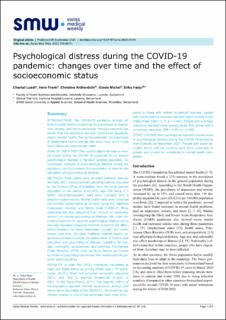Please use this identifier to cite or link to this item:
https://doi.org/10.21256/zhaw-28652| Publication type: | Article in scientific journal |
| Type of review: | Peer review (publication) |
| Title: | Psychological distress during the COVID-19 pandemic : changes over time and the effect of socioeconomic status |
| Authors: | Luedi, Chantal Frank, Irène Krähenbühl, Christine Michel, Gisela Harju, Erika |
| et. al: | No |
| DOI: | 10.57187/smw.2023.40111 10.21256/zhaw-28652 |
| Published in: | Swiss Medical Weekly |
| Volume(Issue): | 153 |
| Issue: | 9 |
| Page(s): | 40111 |
| Issue Date: | 2023 |
| Publisher / Ed. Institution: | EMH Swiss Medical Publishers |
| ISSN: | 1424-3997 |
| Language: | English |
| Subject (DDC): | 616.89: Mental disorders, clinical psychology and psychiatry |
| Abstract: | Introduction: The COVID-19 pandemic strongly affected mental health, increasing the prevalence of depression, anxiety, and stress worldwide. Previous research has shown that low education and low income can negatively impact mental health. During the pandemic, the population of Switzerland had to change their daily lives, which might have influenced their mental health. Aims of the study: We used longitudinal data on mental health during the COVID-19 pandemic to (a) assess psychological distress in the adult general population, (b) investigate changes in psychological distress during the pandemic, and (c) evaluate the association of income and education with psychological distress. Methods: Participants were recruited between January and May 2021 using a random sampling method, provided by the Federal Office of Statistics, from the adult general population in the canton of Lucerne (age ≥20 years, n = 5092). Sociodemographic data were collected with a baseline questionnaire. Mental health data were collected via monthly digital follow-up surveys using the validated Depression, Anxiety, and Stress Scale (DASS-21, three subscales with five categories from “normal” to “extremely severe”) to assess psychological distress. We used descriptive statistics to measure psychological distress and a one-way repeated measures ANOVA to test for the differences between the mean depression, anxiety, and stress scores over time. We used multilevel ordered logistic regression models to assess the association of income and education with psychological distress, adjusting for sex, age, nationality, employment, and previous Polymerase Chain Reaction (PCR) tests, as these factors are known to influence psychological distress and socioeconomic position within countries. Results: In total, 953 (83%) individuals completed at least one digital follow-up survey (mean age = 57 years, range: 20–91). Most had achieved secondary education (95%) and had a monthly household income of 6001–12,000 Swiss Francs (41%). The majority (>80%) of the population reported “normal” depression, anxiety, and stress levels according to the DASS-21. We found no significant change in any of the subscales over time. Compared to those with middle household incomes, people with low household incomes reported higher anxiety levels (Odds Ratio [OR] = 2.11, p = 0.041). People with a tertiary education reported lower anxiety levels than those with a secondary education (OR = 0.39, p = 0.009). Conclusions: Most participants reported normal levels of psychological distress during the COVID-19 pandemic from February to November 2021. People with lower education levels and low incomes were more vulnerable to anxiety and should be considered in mental health campaigns. |
| URI: | https://digitalcollection.zhaw.ch/handle/11475/28652 |
| Fulltext version: | Published version |
| License (according to publishing contract): | CC BY 4.0: Attribution 4.0 International |
| Departement: | School of Health Sciences |
| Organisational Unit: | Institute of Nursing (IPF) |
| Appears in collections: | Publikationen Gesundheit |
Files in This Item:
| File | Description | Size | Format | |
|---|---|---|---|---|
| 2023_Luedi-etal_Psychological-stress-during-the-COVID19-pandemic_smw.pdf | 525.94 kB | Adobe PDF |  View/Open |
Show full item record
Luedi, C., Frank, I., Krähenbühl, C., Michel, G., & Harju, E. (2023). Psychological distress during the COVID-19 pandemic : changes over time and the effect of socioeconomic status. Swiss Medical Weekly, 153(9), 40111. https://doi.org/10.57187/smw.2023.40111
Luedi, C. et al. (2023) ‘Psychological distress during the COVID-19 pandemic : changes over time and the effect of socioeconomic status’, Swiss Medical Weekly, 153(9), p. 40111. Available at: https://doi.org/10.57187/smw.2023.40111.
C. Luedi, I. Frank, C. Krähenbühl, G. Michel, and E. Harju, “Psychological distress during the COVID-19 pandemic : changes over time and the effect of socioeconomic status,” Swiss Medical Weekly, vol. 153, no. 9, p. 40111, 2023, doi: 10.57187/smw.2023.40111.
LUEDI, Chantal, Irène FRANK, Christine KRÄHENBÜHL, Gisela MICHEL und Erika HARJU, 2023. Psychological distress during the COVID-19 pandemic : changes over time and the effect of socioeconomic status. Swiss Medical Weekly. 2023. Bd. 153, Nr. 9, S. 40111. DOI 10.57187/smw.2023.40111
Luedi, Chantal, Irène Frank, Christine Krähenbühl, Gisela Michel, and Erika Harju. 2023. “Psychological Distress during the COVID-19 Pandemic : Changes over Time and the Effect of Socioeconomic Status.” Swiss Medical Weekly 153 (9): 40111. https://doi.org/10.57187/smw.2023.40111.
Luedi, Chantal, et al. “Psychological Distress during the COVID-19 Pandemic : Changes over Time and the Effect of Socioeconomic Status.” Swiss Medical Weekly, vol. 153, no. 9, 2023, p. 40111, https://doi.org/10.57187/smw.2023.40111.
Items in DSpace are protected by copyright, with all rights reserved, unless otherwise indicated.